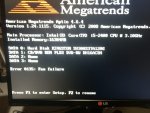- Joined
- Oct 1, 2007
- Messages
- 2,929
- Points
- 113
I have been having this strange problem with the CPU fan on my PC lately. Right from boot I get an error message "0135: Fan Failure" and the fan immediately speeds up to maximum speed. No matter what I do it will stay at full speed for as long as the PC is on. I have been monitoring the system temperature with Open Hardware Monitor and the CPU temperature always hovers in the mid 30C range, never getting really high. Today I unplugged both the Case Fan and the CPU Fan from the motherboard and swapped them around. Now the case fan will rev up to full speed. Seems to be a problem deeper than the fan itself. In the scheme of things it doesn't really prevent me from doing anything with the PC, but that sound sure is annoying lol. System is a Lenovo M91p full tower desktop.
Error message and some system specs below.

Error message and some system specs below.





